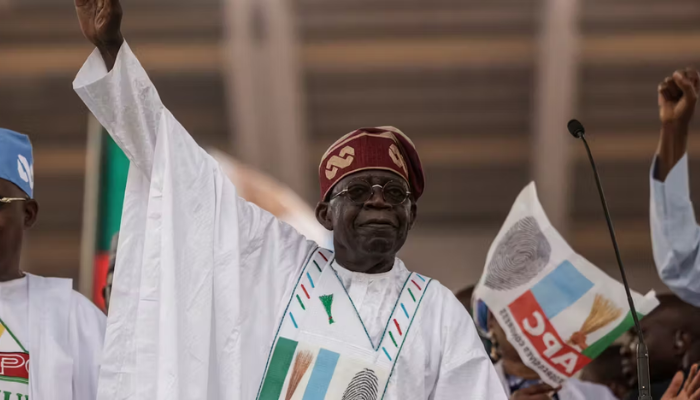As Nigeria approaches the mid-point of President Bola Ahmed Tinubu’s first term in office, public interest in the country’s political direction is intensifying. President Tinubu has declared his intention to seek re-election in 2027, a move that has received official backing from the All Progressives Congress (APC).
BusinessDay’s May 2025 TalkExchange poll has revealed growing dissatisfaction with President Bola Ahmed Tinubu’s leadership, economic reforms, and bid for re-election in 2027. The results show that a majority of respondents are disillusioned with the government’s performance, while others question the long-term impact of the current administration’s economic and political decisions.
Rejection of 2027 re-election bid
When asked if they supported President Tinubu’s bid for a second term, more than half of the respondents (53.1%) said they do not support it. Only 25% expressed strong support, while 15.6% said they supported it with reservations. A small group (6.3%) remained undecided.
Respondents who opposed the second-term bid pointed to “worsening living conditions,” “lack of direction,” and “a disconnect between government and citizens.” Some said, “this administration has destroyed the hope of the average Nigerian,” while others expressed concern about “the president’s focus on consolidating power.”
APC’s endorsement draws mixed reactions
The ruling All Progressives Congress (APC) has officially endorsed President Tinubu for the 2027 election. However, public opinion shows deep divisions. Nearly half (49%) strongly oppose the endorsement, while 13.5% somewhat oppose it. Just over one-third expressed support — 26% strongly and 11.5% somewhat.
Several respondents questioned the rationale behind the endorsement, calling it “tone-deaf” and “premature.” Others felt the decision ignored “the pain Nigerians are going through daily.”
Economic reforms: Pain or progress?
The president’s major economic policies, including fuel subsidy removal and currency liberalisation, received sharp criticism. A large majority (60.4%) said the reforms have made life worse for the average Nigerian. Only 12.5% believed they had greatly benefited the average citizen, while 13.5% each said the policies brought either “some benefit” or “little to none.”
Citizens shared real-life experiences of inflation, job losses, and collapsing businesses. One respondent noted, “high cost of living and subsidy removal crashed my farming business.” Another remarked, “managing a difficult situation to enhance our future development is necessary, but implementation has failed.”
Economic hardship tops national concerns
When asked about their top concern under Tinubu’s leadership, 64.6% of respondents cited economic hardship and the rising cost of living, followed by insecurity at 22.9%. Political instability and party defections were a concern for 5.2%, while only 7.3% said they had no major concerns.
Many shared personal stories. One person said, “People cannot eat. I remember an artisan and his boy who drank only one sachet of water till evening. They had nothing else.” Another added, “We are in survival mode. The hardship is everywhere, and there’s no hope.”
Opposition parties seen as weak
Despite public dissatisfaction with the ruling party, confidence in the opposition remains low. Nearly two-thirds of respondents (63.5%) said they are not confident that opposition parties can present a strong alternative to President Tinubu in 2027. Only 12.5% said they are very confident, while 22.9% were somewhat confident.
This reflects a political environment where the lack of credible alternatives leaves voters feeling stuck. One respondent said, “They’re all birds of the same feather. I don’t think my vote will make a difference.”
Defections raise questions about democracy
Recent defections from opposition parties to the APC sparked mixed feelings. A large portion (46.9%) said such moves are “common in Nigerian politics,” while 43.8% believe they “weaken democracy.” Only 5.2% said defections “strengthen democracy,” and 4.2% stated that it “doesn’t influence my political views.”
One person said, “It’s just a game of self-interest. No one cares about the people.” Another remarked, “The political class keeps recycling itself.”
Government performance rated poorly
Respondents gave a harsh assessment of the APC government’s performance since 2023. A combined 68.8% rated it as either “poor” (24%) or “very poor” (44.8%). Only 6.3% rated it as “excellent” and 25% said it was “good.”
Critics called out policy missteps, lack of transparency, and worsening insecurity. “Governance has no human face,” one participant said. “People are told to sacrifice while those in power live in luxury.”
Public voices: Reform or regression?
Through open responses, many citizens acknowledged that some of Tinubu’s reforms were necessary, but the rollout was flawed. One said, “Subsidy removal was long overdue but poorly cushioned.” Another shared, “We were promised reform, but we got chaos.”
Some respondents expressed concern about the psychological toll. One wrote, “The insecurity has affected me so much I can’t travel to another state unless by plane. Even then, I’m afraid.”
Yet a few respondents saw hope. “We need to persevere,” one said. “The reforms are necessary. If we stay the course, we will benefit in the long run.”
What Nigerians want in 2027
Looking ahead to the next election, Nigerians outlined what they want in a presidential candidate. Common responses included integrity, competence, boldness, empathy, and commitment to ending insecurity.
“We need someone who understands the economy and will tackle inflation, joblessness, and food insecurity,” one respondent wrote. Another added, “Someone who respects the rule of law and does not abuse power.”
Some respondents were blunt: “No more recycled elites. Nigeria needs a leader that cares.”
Take a look at previous poll results.

